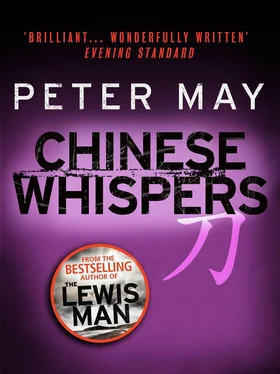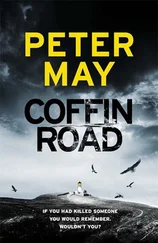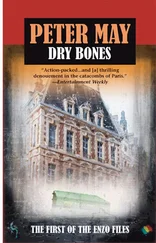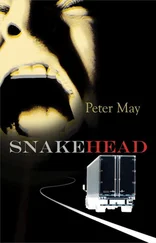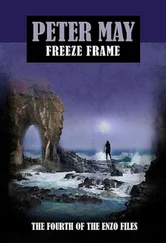Peter May - Chinese Whispers
Здесь есть возможность читать онлайн «Peter May - Chinese Whispers» весь текст электронной книги совершенно бесплатно (целиком полную версию без сокращений). В некоторых случаях можно слушать аудио, скачать через торрент в формате fb2 и присутствует краткое содержание. Год выпуска: 2012, Жанр: Триллер, на английском языке. Описание произведения, (предисловие) а так же отзывы посетителей доступны на портале библиотеки ЛибКат.
- Название:Chinese Whispers
- Автор:
- Жанр:
- Год:2012
- ISBN:нет данных
- Рейтинг книги:4 / 5. Голосов: 1
-
Избранное:Добавить в избранное
- Отзывы:
-
Ваша оценка:
- 80
- 1
- 2
- 3
- 4
- 5
Chinese Whispers: краткое содержание, описание и аннотация
Предлагаем к чтению аннотацию, описание, краткое содержание или предисловие (зависит от того, что написал сам автор книги «Chinese Whispers»). Если вы не нашли необходимую информацию о книге — напишите в комментариях, мы постараемся отыскать её.
Chinese Whispers — читать онлайн бесплатно полную книгу (весь текст) целиком
Ниже представлен текст книги, разбитый по страницам. Система сохранения места последней прочитанной страницы, позволяет с удобством читать онлайн бесплатно книгу «Chinese Whispers», без необходимости каждый раз заново искать на чём Вы остановились. Поставьте закладку, и сможете в любой момент перейти на страницу, на которой закончили чтение.
Интервал:
Закладка:
‘What did happen?’ Li asked.
‘No one knows. It just went up in flames one night. They got all the children out safely, but by the time the fire fighters got there it was too late to save it. An old building, you see. Mostly built of wood. It was all over in an hour.’
Li said, ‘What about the records? All the kids who passed through the orphanage over the years. Presumably you still have that information on file here?’
The old lady shook her head sadly. ‘I’m afraid not,’ she said. ‘In those days all the records were kept at the orphanage itself. Everything was hand-written then. I know, because I was working here all those years ago when the place went up in flames. All our records were hand-written, too. We still have them in the basement. Unfortunately, the records at Wutaishan were destroyed along with everything else. The only thing that burns faster than wood is paper.’ She scratched her head. ‘A great shame. Generations of kids, their history lost forever. And the orphanage was the only family they ever had.’
Li felt himself slipping into a trough of despair. If the orphanage was gone, its records destroyed, there was no way to prove that Cao Xu was not who he said he was. Clearly he had covered his tracks well.
‘What’s your interest?’ the old lady asked, scrutinising him shrewdly.
Li decided to take a chance. ‘I’m a police officer from Beijing,’ he said. ‘We’re investigating the history of someone who grew up in the orphanage.’
The old lady smiled. ‘I thought as much,’ she said. ‘I can always tell a policeman. You’re too big to be anything else. And too confident.’ She paused to think. ‘When did this person leave the orphanage?’
Li shrugged. ‘I don’t know exactly.’
‘Approximately, then.’
‘I should think he would have been around sixteen or seventeen. Maybe even eighteen. He was born in 1948, which would mean somewhere between 1967 and 1969.’
The old lady thought for a long time. ‘Old Mister Meng would have been there around that time.’
‘Mister Meng?’ Li asked.
She came out of her reverie. ‘Yes. He cleans the hall, and the public record office when it shuts at five. He worked as an odd-job man at the orphanage from the mid-fifties until it burned down in the early seventies. There was some speculation at the time about whether he might have been responsible for the fire. But I don’t think so. It was just idle chatter. He’s worked as a cleaner for the municipality ever since. Retired now, of course. But still doing an hour a day for the extra cash.’ She glanced at her watch. ‘If you come back in a couple of hours, you’ll be able to talk to him if you want.’
* * *
It was a short taxi ride to the south-east corner of Taiyuan City, but the twin towers of the Double-pagoda Temple were visible almost as soon as they left the city centre. The taxi driver was a chatty type, engaging Li in reluctant conversation. Was this his first trip to Taiyuan City? What did he think of it? Where was he from? Did he want to take a detour to the Yongzuo Temple? Li declined the offer, to the driver’s obvious disappointment. He began to tell Li its history. ‘The towers were built in the Ming dynasty,’ he said. ‘Under the Emperor Waili. They are fifty-three metres high. Thirteen storeys of brick and stone.’
Li looked at the towers as they circled them on the ring road. They were awe-inspiring this close to, octagonal structures, tapering to a point at the top, aiming straight up to the heavens. It was little wonder that they had been chosen as the visual symbol of the city. In past centuries, when the buildings of the town were no more than one storey high, it must have been possible to see them for miles.
‘Are you sure you don’t want to stop?’ the driver said. ‘You can see the tablets of the famous calligraphers, Wang Xizhi, Yan Zhenqing and Su Dongpo.’
‘Sounds like something I really shouldn’t miss,’ Li said. ‘Next time.’
The driver shrugged. ‘As you like.’
The Wutaishan Orphanage was on the old road heading south out of town towards the great expanse of paddy fields on the Shanxi plain. There were rows of brick-built workers’ houses in amongst groves of bamboo and eucalyptus, great bundles of dried corn stalks stacked at the roadside. The original wall still stood around a large area of garden, now overgrown and gone to seed. Rusted wrought-iron gates hung open on buckled hinges. Li asked the driver to wait for him and wandered into the grounds. It had obviously become a dumping ground for overspill refuse from the surrounding houses, filled with the carcasses of long dead cars and bicycles. Amongst the tangling overgrowth, you could still make out the foundations of the original complex of single-storey buildings which had made up the orphanage. The thorns of wild roses caught on Li’s trousers as he tramped down the growth and made his way to the heart of the site where the main building had stood. Some charred stumps of wooden uprights could still be found poking through the undergrowth. Blackened bricks scattered around where they had fallen when the walls collapsed. He tried to imagine how it must have been, flames reaching into the night sky, the crackle of burning wood, the screams of the children as they were ushered out into the dark to stand at a safe distance and watch the only home they had known vanish in the smoke.
He kicked an old tin can and sent it rattling across the dried ground, and looked up to see the twin towers of the Double-pagoda Temple dominating the skyline. It would have been impossible to have lived here and not recognise them.
But there was nothing here for Li. Nothing but ghosts and memories. Other people’s memories.
The taxi took him back to the city in about twenty minutes, and he killed the next hour sitting in Yingze Park, drinking a three- yuan can of beer and watching small boys sailing tiny boats in the wind that ruffled the surface of the lake. He let the world pass him by and tried to think of nothing, to keep his mind empty, free to be full only of things that mattered. But despair kept leaking in.
He made his way back to the public records office and got there a little after five. The woman from the citizens’ registry was waiting for him at the top of the steps, wrapped up in a large padded jacket and carrying a deep denim bag. She nodded through glass doors to the large reception hall. ‘That’s him. I told him you’d be looking for him.’
Li saw a wizened old man in faded blue overalls, with a bucket and mop, cleaning the marble tiles on the vast expanse of floor inside. ‘Thank you,’ he said, and pushed open the door into the lobby.
As Li approached him, the old man glanced up and then returned his gaze to the sweep of his mop across the shiny surface of the tiles.
‘Mister Meng?’ Li said.
‘You’ll be the cop from Beijing,’ old Meng said, and Li glanced towards the glass entrance to see the lady from the citizens’ registry watching them with unabashed curiosity.
‘That’s right.’
‘I had nothing to do with that fire.’ Still the old man did not look up.
‘I don’t think for a minute that you had,’ Li said.
The old man gave him a long, appraising look, decayed stumps of teeth gnawing on a piece of his cheek. ‘What do you want, then?’
‘The lady from the citizens’ registry told me that you worked at the orphanage from the mid-fifties.’
‘Nosy old bitch!’ old Meng complained. ‘None of her bloody business.’
‘Did you?’ Li asked.
The old man nodded. ‘I loved that place,’ he said. ‘Knew every one of those kids as if they were my own. Poor little bastards. The place was run by women. There was hardly a man about the place. No father figure, only matriarchs. Broke my heart when it burned down.’
Читать дальшеИнтервал:
Закладка:
Похожие книги на «Chinese Whispers»
Представляем Вашему вниманию похожие книги на «Chinese Whispers» списком для выбора. Мы отобрали схожую по названию и смыслу литературу в надежде предоставить читателям больше вариантов отыскать новые, интересные, ещё непрочитанные произведения.
Обсуждение, отзывы о книге «Chinese Whispers» и просто собственные мнения читателей. Оставьте ваши комментарии, напишите, что Вы думаете о произведении, его смысле или главных героях. Укажите что конкретно понравилось, а что нет, и почему Вы так считаете.
